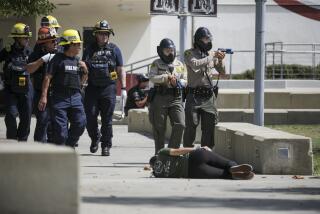Gov. Brown caps a month of bill signings, vetoes
- Share via
Reporting from Sacramento — Gov. Jerry Brown announced early Monday that he had outlawed the open carrying of handguns in public in California, a controversial practice that top law enforcement officials had denounced as dangerous.
Clearing his desk of final bills sent to him by the Legislature, Brown signed the ban into law after it was backed by Los Angeles Police Chief Charlie Beck, Los Angeles County Sheriff Lee Baca and other law enforcement officials throughout the state.
“I listened to the California police chiefs,” Brown said in a statement.
Beck and other top cops were concerned that the open toting of guns wastes officers’ time responding to calls about armed “suspects” and can lead accidentally to violent confrontation.
Assemblyman Anthony Portantino (D-La Canada Flintridge), author of the ban, and his supporters said California is no longer the wild west, where citizens had to carry six-shooters on their hips for protection.
“The bottom line is the streets will be safer for law enforcement and families,” Portantino said.
The measure drew national attention.
“This finally puts an end to the dangerous and intimidating practice of carrying openly displayed guns in public,” said Brian Malte, director of state legislation for the Brady Campaign to Prevent Gun Violence. “California families will now be able to take their families to the park or out to eat without the worry of getting shot by some untrained, unscreened, self-appointed vigilante.”
The law, AB 144, takes effect Jan. 1. Violations will be a misdemeanor, with offenders facing up to one year in jail and a potential fine of $1,000. Gun owners may still apply to their local law enforcement agency for a permit to carry a concealed firearm.
The Democratic governor surprised some people in April by telling a law enforcement conference that he owns three guns and that it is natural for people to have firearms in their homes. In a presidential debate in 1992, Brown had argued in favor of a moratorium on gun sales.
Opponents of the Portantino bill, including Mike Stollenwerk, co-founder of the group OpenCarry.org, say the new law is an attempt to undermine the Second Amendment right to bear arms.
“California already has the most convoluted and confusing gun laws in the country,” Stollenwerk said Sunday night, predicting that the ban “will result in mass confusion by police and the public as to what the law is, and prosecution of well-meaning people.”
In other action, the governor announced an extension of tax credits for state film production until June 2015, signing into law a measure that could help keep more Hollywood jobs in California. The incentive would otherwise have expired a year earlier.
Makers of film and television shows in California will continue to receive $100 million in annual tax breaks if they do the work here.
“Extending the motion picture tax credit will create new jobs and keep Californians employed,” said Elizabeth Ashford, a spokeswoman for Brown. “Entertainment is a backbone California industry, and we have a responsibility to help keep film and television production here.”
Brown’s signature of AB 1069, by Assemblyman Felipe Fuentes (D-Sylmar), continues a program created as part of a 2009 budget deal signed by then Gov. Arnold Schwarzenegger. It offers a rebate of up to 25% of production expenses and can be used to offset state taxes. The credits cannot be used to pay actors’ salaries.
Advocates for the tax relief, including the Motion Picture Assn. of America, championed the governor’s move.
Spokesman Vans Stevenson called the incentives “a proven program that creates jobs and stimulates the economy.”
Leaders of some of the state’s largest labor unions had criticized the proposal as a corporate giveaway at a time when the state is slashing education, services for the needy and other state-funded programs.
In addition to the Hollywood measure, the governor signed one prohibiting alcoholic beverages from being sold at automated checkout stands operated by customers in stores. Assemblywoman Fiona Ma (D-San Francisco) authored AB 183 as another way to prevent minors from purchasing liquor.
Brown also vetoed a bill that would have hindered the construction of Wal-Mart Supercenters and other big-box stores by requiring cities and counties to prepare economic-impact reports first.
He said SB 469, by Sen. Juan Vargas (D-San Diego), would “add yet another layer of review to an already cumbersome process.”
On Sunday, Brown barred minors from using tanning beds, required health insurers to include coverage for autism, approved limits on police actions at sobriety checkpoints and rejected legalization of industrial hemp.
More to Read
Sign up for Essential California
The most important California stories and recommendations in your inbox every morning.
You may occasionally receive promotional content from the Los Angeles Times.











